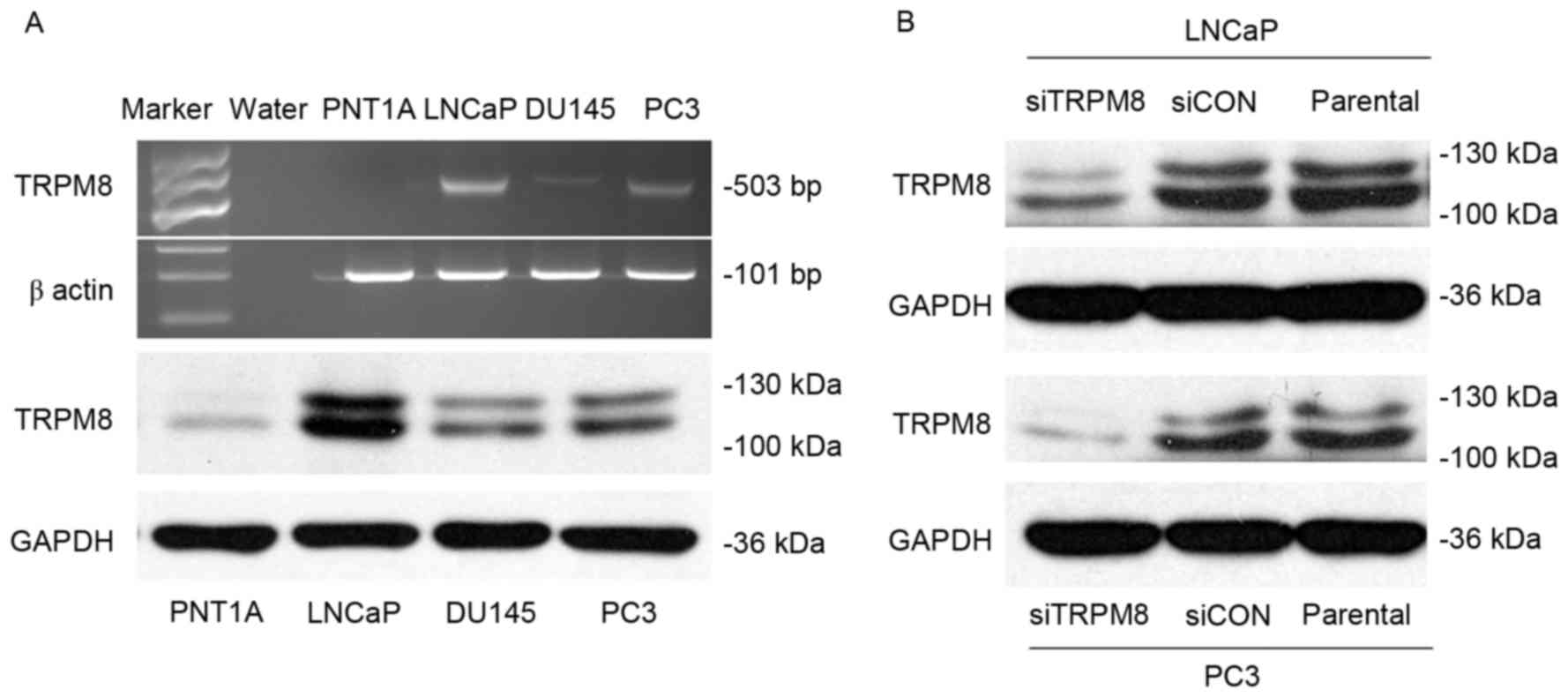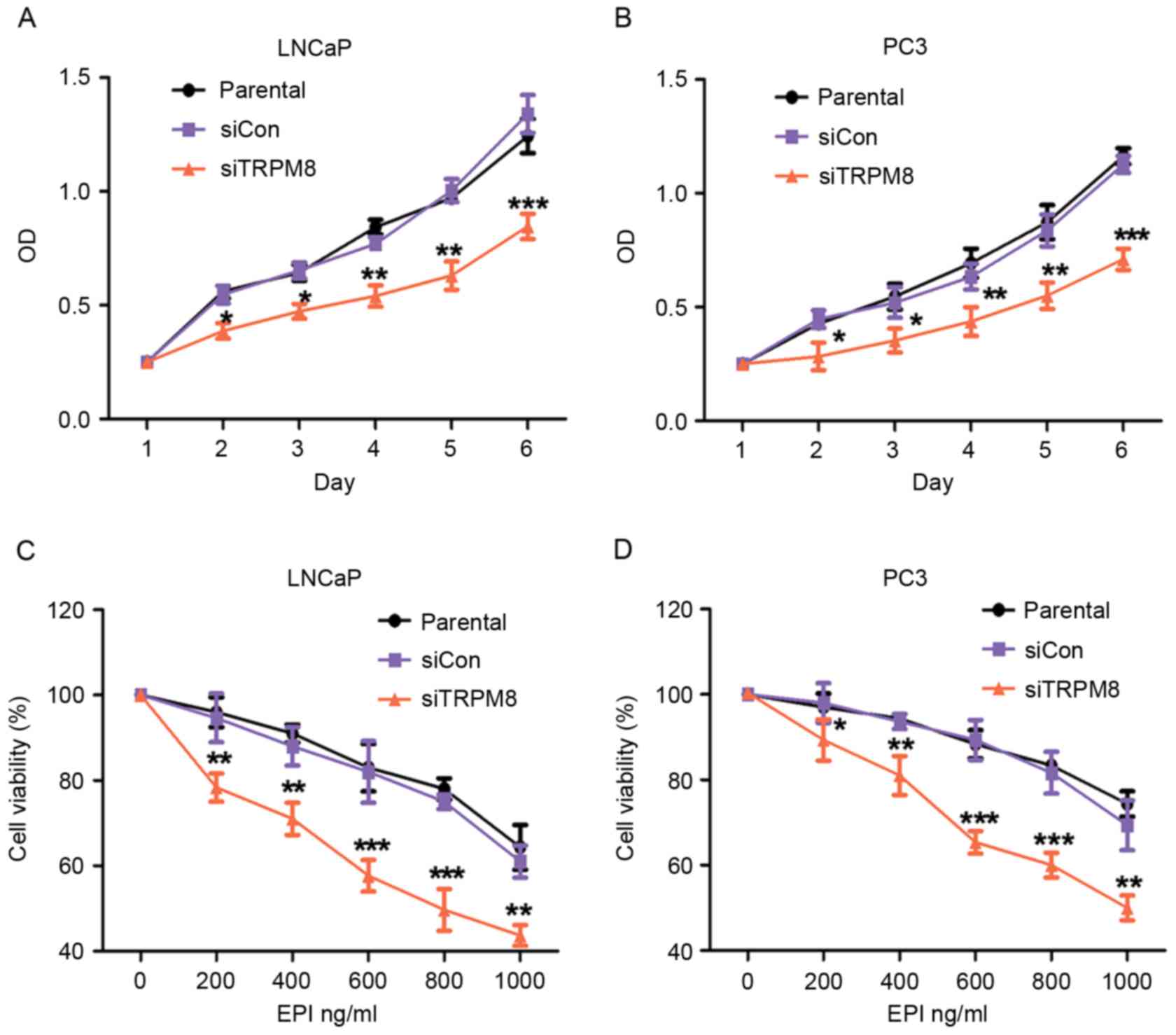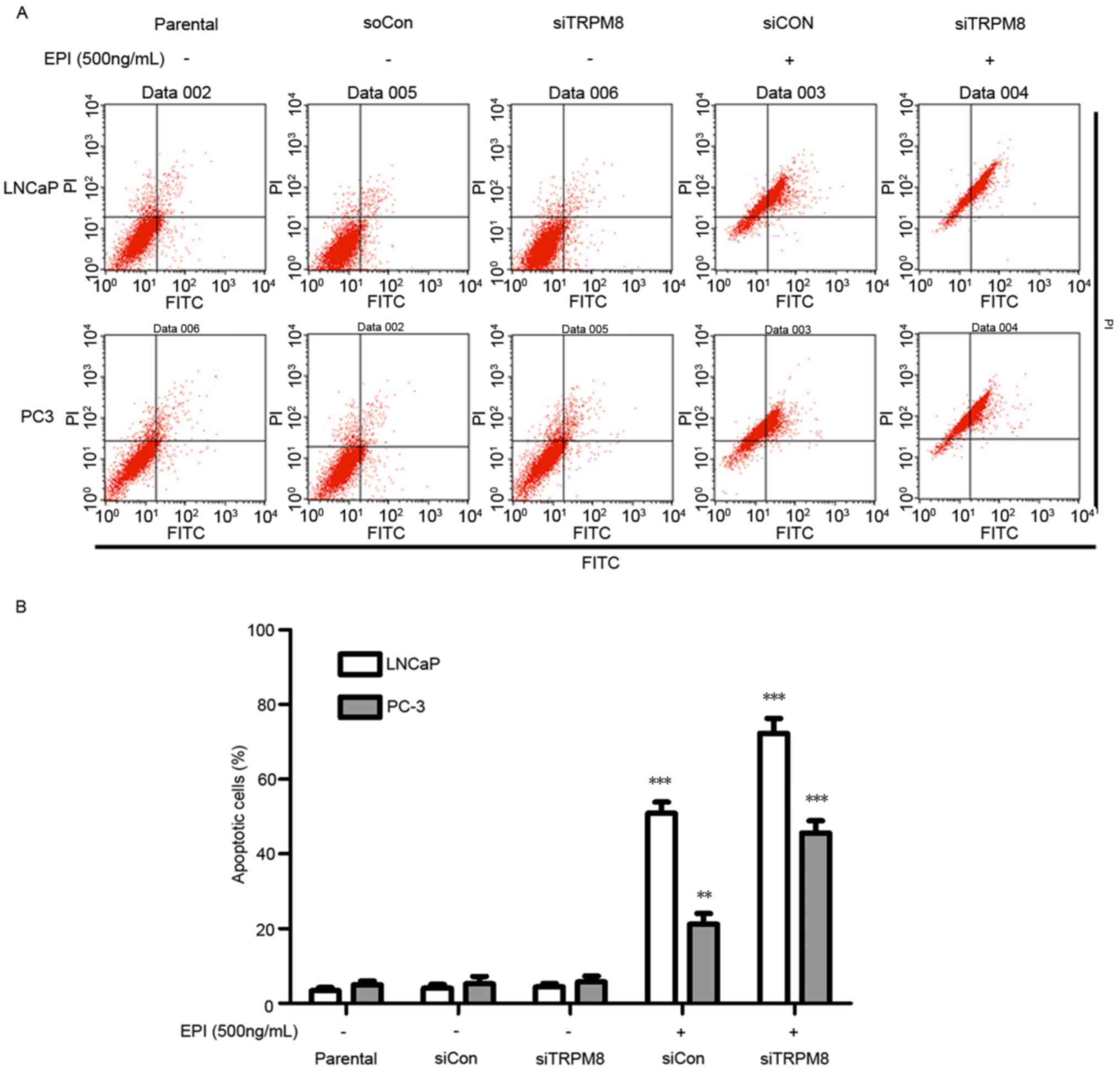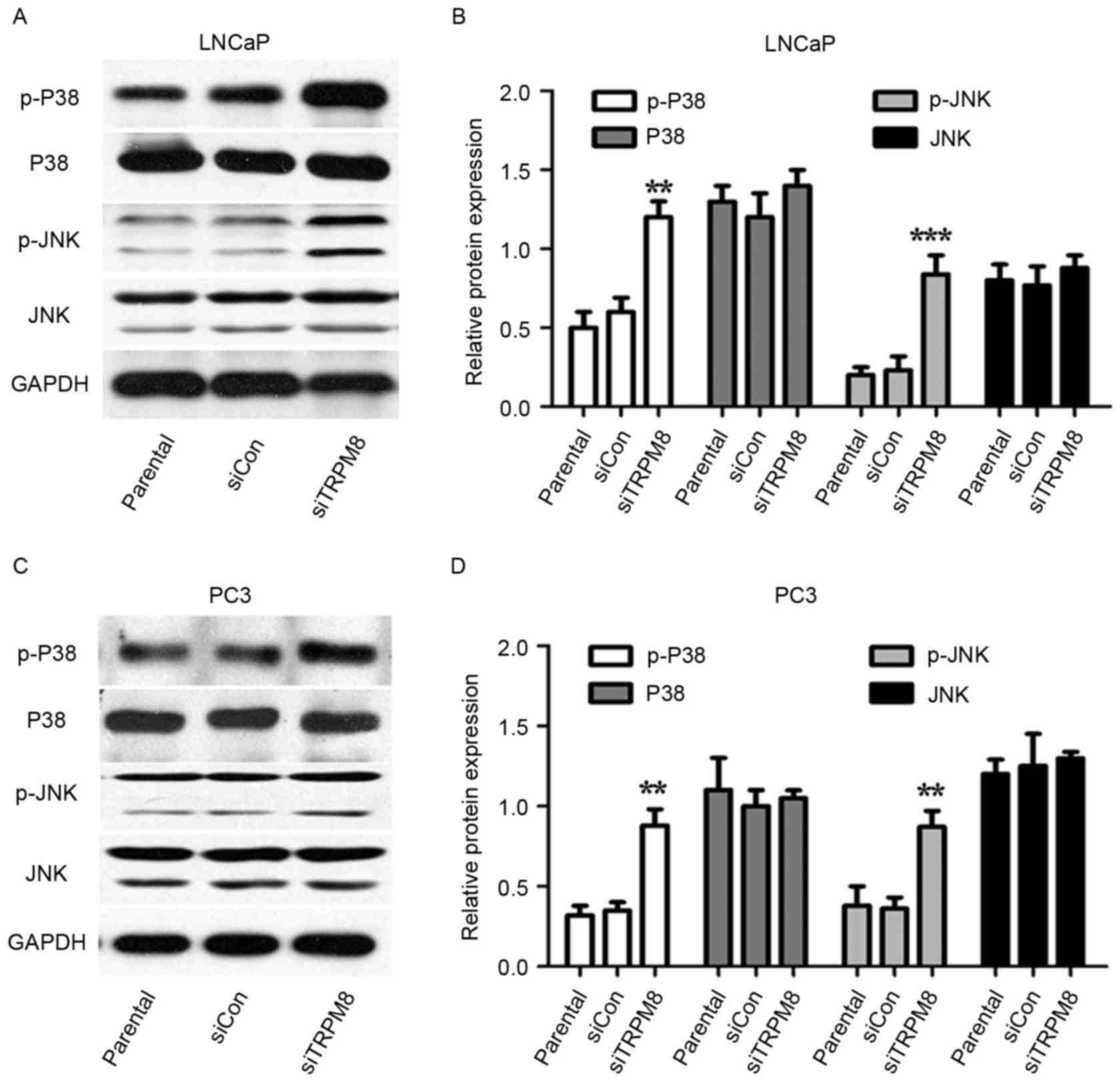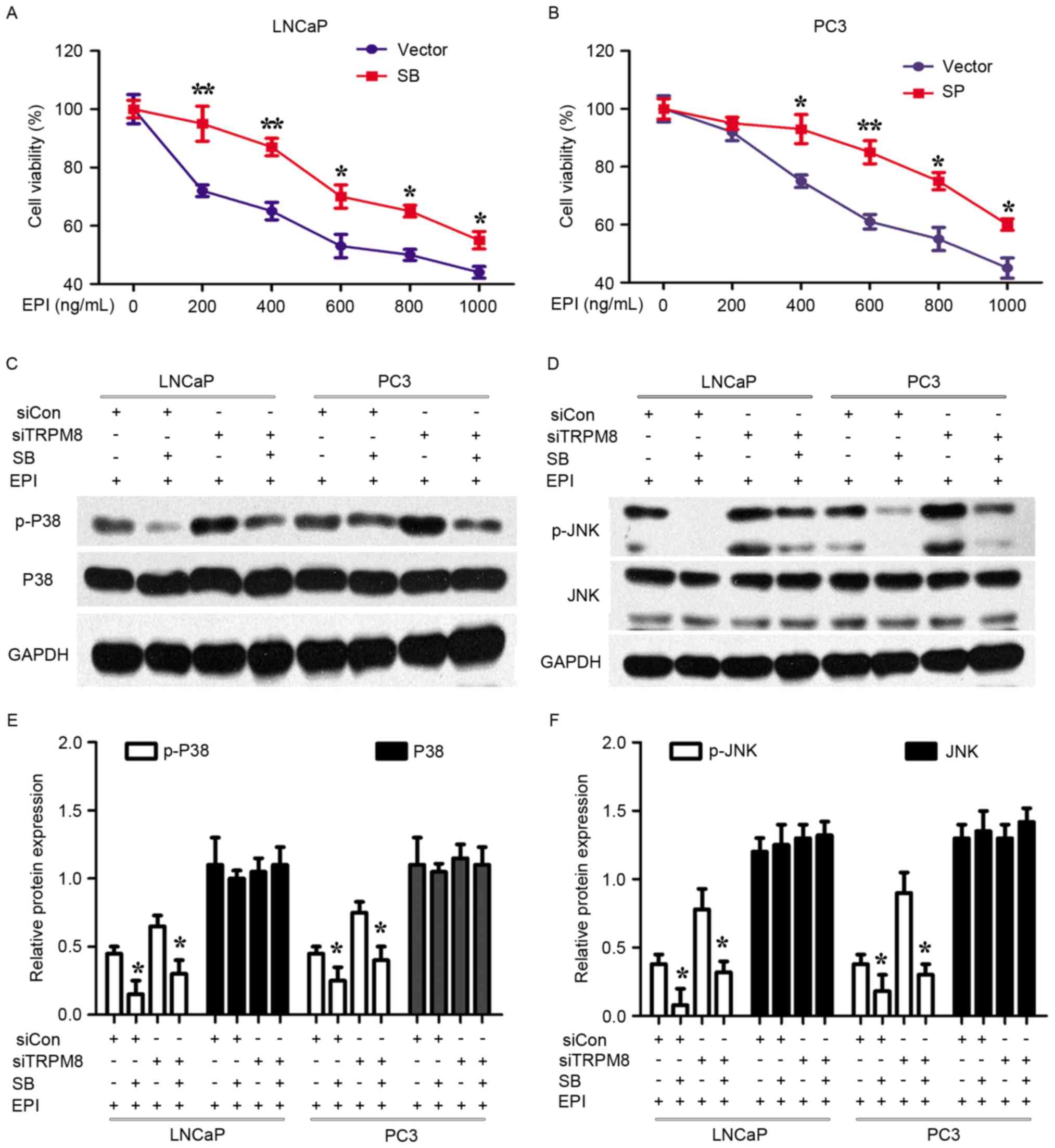|
1
|
Siegel RL, Miller KD and Jemal A: Cancer
statistics, 2016. CA Cancer J Clin. 66:7–30. 2016. View Article : Google Scholar : PubMed/NCBI
|
|
2
|
Zhang L and Barritt GJ: Evidence that
TRPM8 is an androgen-dependent Ca2+ channel required for
the survival of prostate cancer cells. Cancer Res. 64:8365–8373.
2004. View Article : Google Scholar : PubMed/NCBI
|
|
3
|
Egan A, Dong Y, Zhang H, Qi Y, Balk SP and
Sartor O: Castration-resistant prostate cancer: Adaptive responses
in the androgen axis. Cancer Treat Rev. 40:426–433. 2014.
View Article : Google Scholar : PubMed/NCBI
|
|
4
|
Katzenwadel A and Wolf P: Androgen
deprivation of prostate cancer: Leading to a therapeutic dead end.
Cancer Lett. 367:12–17. 2015. View Article : Google Scholar : PubMed/NCBI
|
|
5
|
Petrioli R, Roviello G, Fiaschi AI, Laera
L, Miano ST, De Rubertis G, Barbanti G, Bianco V, Brozzetti S and
Francini E: Rechallenge of docetaxel combined with epirubicin given
on a weekly schedule in advanced castration-resistant prostate
cancer patients previously exposed to docetaxel and abiraterone
acetate: A single-institution experience. Med Oncol. 32:522015.
View Article : Google Scholar : PubMed/NCBI
|
|
6
|
Thebault S, Flourakis M, Vanoverberghe K,
Vandermoere F, Roudbaraki M, Lehen'kyi V, Slomianny C, Beck B,
Mariot P, Bonnal JL, et al: Differential role of transient receptor
potential channels in Ca2+ entry and proliferation of
prostate cancer epithelial cells. Cancer Res. 66:2038–2047. 2006.
View Article : Google Scholar : PubMed/NCBI
|
|
7
|
Yee NS: Roles of TRPM8 ion channels in
cancer: Proliferation, survival and invasion. Cancers (Basel).
7:2134–2146. 2015. View Article : Google Scholar : PubMed/NCBI
|
|
8
|
Grolez GP and Gkika D: TRPM8 puts the
chill on prostate cancer. Pharmaceuticals (Basel). 9:E442016.
View Article : Google Scholar : PubMed/NCBI
|
|
9
|
Flourakis M and Prevarskaya N: Insights
into Ca2+ homeostasis of advanced prostate cancer cells. Biochim
Biophys Acta. 1793:1105–1109. 2009. View Article : Google Scholar : PubMed/NCBI
|
|
10
|
Vanoverberghe K, Vanden Abeele F, Mariot
P, Lepage G, Roudbaraki M, Bonnal JL, Mauroy B, Shuba Y, Skryma R
and Prevarskaya N: Ca2+ homeostasis and apoptotic
resistance of neuroendocrine-differentiated prostate cancer cells.
Cell Death Differ. 11:321–330. 2004. View Article : Google Scholar : PubMed/NCBI
|
|
11
|
Skryma R, Mariot P, Bourhis XL, Coppenolle
FV, Shuba Y, Vanden Abeele F, Legrand G, Humez S, Boilly B and
Prevarskaya N: Store depletion and store-operated Ca2+
current in human prostate cancer LNCaP cells: Involvement in
apoptosis. J Physiol. 527:71–83. 2000. View Article : Google Scholar : PubMed/NCBI
|
|
12
|
Vanden AF, Roudbaraki M, Shuba Y, Skryma R
and Prevarskaya N: Store-operated Ca2+ current in
prostate cancer epithelial cells. Role of endogenous
Ca2+ transporter type 1. J Biol Chem. 278:15381–15389.
2003. View Article : Google Scholar : PubMed/NCBI
|
|
13
|
Yu S, Xu Z, Zou C, Wu D, Wang Y, Yao X, Ng
CF and Chan FL: Ion channel TRPM8 promotes hypoxic growth of
prostate cancer cells via an O2-independent and RACK1-mediated
mechanism of HIF-1α stabilization. J Pathol. 234:514–525. 2014.
View Article : Google Scholar : PubMed/NCBI
|
|
14
|
Peng M, Wang Z, Yang Z, Tao L, Liu Q, Yi
LU and Wang X: Overexpression of short TRPM8 variant alpha promotes
cell migration and invasion and decreases starvation-induced
apoptosis in prostate cancer LNCaP cells. Oncol Lett. 10:1378–1384.
2015. View Article : Google Scholar : PubMed/NCBI
|
|
15
|
Bidaux G, Borowiec AS, Dubois C, Delcourt
P, Schulz C, Vanden Abeele F, Lepage G, Desruelles E, Bokhobza A,
Dewailly E, et al: Targeting of short TRPM8 isoforms induces
4TM-TRPM8-dependent apoptosis in prostate cancer cells. Oncotarget.
7:29063–29080. 2016. View Article : Google Scholar : PubMed/NCBI
|
|
16
|
Asuthkar S, Velpula KK, Elustondo PA,
Demirkhanyan L and Zakharian E: TRPM8 channel as a novel molecular
target in androgen-regulated prostate cancer cells. Oncotarget.
6:17221–17236. 2015. View Article : Google Scholar : PubMed/NCBI
|
|
17
|
Valero ML, Mello de Queiroz F, Stühmer W,
Viana F and Pardo LA: TRPM8 ion channels differentially modulate
proliferation and cell cycle distribution of normal and cancer
prostate cells. PLoS One. 7:e518252012. View Article : Google Scholar : PubMed/NCBI
|
|
18
|
Grolez GP and Gkika D: TRPM8 puts the
chill on prostate cancer. Pharmaceuticals (Basel). 9:E442016.
View Article : Google Scholar : PubMed/NCBI
|
|
19
|
Zhu G, Wang X, Yang Z, Cao H, Meng Z, Wang
Y and Chen D: Effects of TRPM8 on the proliferation and
angiogenesis of prostate cancer PC-3 cells in vivo. Oncol Lett.
2:1213–1217. 2011. View Article : Google Scholar : PubMed/NCBI
|
|
20
|
Yang ZH, Wang XH, Wang HP and Hu LQ:
Effects of TRPM8 on the proliferation and motility of prostate
cancer PC-3 cells. Asian J Androl. 11:157–165. 2009. View Article : Google Scholar : PubMed/NCBI
|
|
21
|
Peng M, Wang Z, Yang Z, Tao L, Liu Q, Yi
LU and Wang X: Overexpression of short TRPM8 variant α promotes
cell migration and invasion and decreases starvation-induced
apoptosis in prostate cancer LNCaP cells. Oncol Lett. 10:1378–1384.
2015. View Article : Google Scholar : PubMed/NCBI
|
|
22
|
Valero M, Morenilla-Palao C, Belmonte C
and Viana F: Pharmacological and functional properties of TRPM8
channels in prostate tumor cells. Pflugers Arch. 461:99–114. 2011.
View Article : Google Scholar : PubMed/NCBI
|
|
23
|
Liu T, Fang Z, Wang G, Shi M, Wang X,
Jiang K, Yang Z, Cao R, Tao H, Wang X and Zhou J: Anti-tumor
activity of the TRPM8 inhibitor BCTC in prostate cancer DU145
cells. Oncol Lett. 11:182–188. 2016. View Article : Google Scholar : PubMed/NCBI
|
|
24
|
Petrioli R, Pascucci A, Conca R, Chiriacò
G, Francini E, Bargagli G, Fiaschi AI, Manganelli A, De Rubertis G
and Barbanti G: Docetaxel and epirubicin compared with docetaxel
and prednisone in advanced castrate-resistant prostate cancer: A
randomised phase II study. Br J Cancer. 104:613–619. 2011.
View Article : Google Scholar : PubMed/NCBI
|
|
25
|
Henshall SM, Afar DE, Hiller J, Horvath
LG, Quinn DI, Rasiah KK, Gish K, Willhite D, Kench JG,
Gardiner-Garden M, et al: Survival analysis of genome-wide gene
expression profiles of prostate cancers identifies new prognostic
targets of disease relapse. Cancer Res. 63:4196–4203.
2003.PubMed/NCBI
|
|
26
|
Bidaux G, Flourakis M, Thebault S, Zholos
A, Beck B, Gkika D, Roudbaraki M, Bonnal JL, Mauroy B, Shuba Y, et
al: Prostate cell differentiation status determines transient
receptor potential melastatin member 8 channel subcellular
localization and function. J Clin Invest. 117:1647–1657. 2007.
View Article : Google Scholar : PubMed/NCBI
|
|
27
|
Thebault S, Lemonnier L, Bidaux G,
Flourakis M, Bavencoffe A, Gordienko D, Roudbaraki M, Delcourt P,
Panchin Y, Shuba Y, et al: Novel role of cold/menthol-sensitive
transient receptor potential melastatine family member 8 (TRPM8) in
the activation of store-operated channels in LNCaP human prostate
cancer epithelial cells. J Biol Chem. 280:39423–39435. 2005.
View Article : Google Scholar : PubMed/NCBI
|
|
28
|
Kim SH, Nam JH, Park EJ, Kim BJ, Kim SJ,
So I and Jeon JH: Menthol regulates TRPM8-independent processes in
PC-3 prostate cancer cells. Biochim Biophys Acta. 1792:33–38. 2009.
View Article : Google Scholar : PubMed/NCBI
|















